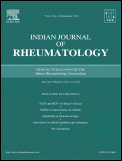
Current Treatment Options in Rheumatology
Scope & Guideline
Delivering crucial findings for enhanced clinical practice in rheumatology.
Introduction
Aims and Scopes
- Multidisciplinary Approaches to Rheumatic Diseases:
The journal covers a range of treatment modalities, including pharmacological interventions, physical therapy, and psychological support, emphasizing a holistic approach to managing rheumatic conditions. - Innovations in Treatment Guidelines and Protocols:
It regularly appraises and discusses updates in treatment guidelines, ensuring clinicians are informed about the latest evidence-based practices in rheumatology. - Understanding Disease Mechanisms and Biomarkers:
Research published often delves into the molecular underpinnings of rheumatic diseases, exploring biomarkers that can guide treatment decisions and improve patient stratification. - Patient-Centered Care and Preferences:
The journal places importance on understanding patient preferences and experiences in treatment, which is crucial for tailoring effective management plans. - Focus on Emerging Therapeutics and Clinical Trials:
A consistent theme is the exploration of new and repurposed therapies, including insights from ongoing clinical trials that could reshape treatment landscapes.
Trending and Emerging
- Immune-Mediated and Autoimmune Conditions:
Research on the treatment of immune-mediated diseases, such as myositis and systemic sclerosis, has gained traction, highlighting the complexities of managing these conditions and the need for specialized interventions. - Role of Biologics and Targeted Therapies:
The increasing focus on biologic agents and targeted therapies represents a significant trend, as these treatments offer more effective solutions compared to traditional methods, particularly in autoimmune conditions. - Integration of Technology in Treatment:
Emerging themes include the use of virtual tools for managing chronic conditions like osteoarthritis, reflecting a growing interest in telemedicine and digital health solutions. - Psychosocial Aspects of Rheumatic Diseases:
There is a rising emphasis on the psychological impact of rheumatic diseases and the importance of incorporating mental health support into treatment plans. - Patient-Centric Research and Outcomes:
An increasing number of studies are focusing on patient preferences, experiences, and outcomes, demonstrating a shift towards more personalized and patient-centered care in rheumatology.
Declining or Waning
- Traditional Pharmacological Treatments for Osteoarthritis:
Discussions around conventional medications for osteoarthritis, such as NSAIDs, have become less frequent as newer, more effective treatment options are developed and explored. - Historical Perspectives on Rheumatic Disease Management:
There has been a noticeable decrease in papers focusing on the historical aspects of treatment, as the focus has shifted to contemporary challenges and innovations. - Basic Science Research without Clinical Relevance:
Research that does not translate into clinical practice or lacks direct implications for patient care has become less prevalent, as the journal increasingly prioritizes studies with immediate practical applications. - Non-Specific Pain Management Strategies:
The journal has moved away from discussing generic pain management approaches in favor of more targeted therapies and personalized medicine. - Outdated Treatment Protocols:
As new guidelines and treatment options emerge, older treatment protocols that lack current relevance are being phased out of the journal's focus.
Similar Journals

SCANDINAVIAN JOURNAL OF RHEUMATOLOGY
Exploring New Horizons in Rheumatology ScienceThe Scandinavian Journal of Rheumatology, published by Taylor & Francis Ltd, is a prestigious peer-reviewed journal dedicated to advancing research in the fields of rheumatology, immunology, and related disciplines. With an ISSN of 0300-9742 and an E-ISSN of 1502-7732, this journal has established itself as a vital platform for disseminating significant findings and innovative approaches in the management of rheumatic diseases since its inception in 1959. As a recognized scholarly outlet, it currently resides within the Q2 category for Medicine (miscellaneous) and ranks #39 out of 73 in Rheumatology according to the 2023 Scopus assessments. This reflects the journal's commitment to high-quality research and its relevance in the scientific community. Although it does not provide Open Access options, the journal's rigorous selection process ensures that only the most impactful research reaches its audience, making it a crucial resource for researchers, clinicians, and students engaged in the exploration of rheumatological and immunological challenges. The journal's broad scope encompasses ongoing studies, clinical trials, and reviews that aim to enhance understanding and treatment of rheumatic conditions, promoting collaboration and knowledge-sharing among professionals in the field.

CLINICAL AND EXPERIMENTAL RHEUMATOLOGY
Navigating the frontiers of immunological discovery.CLINICAL AND EXPERIMENTAL RHEUMATOLOGY is a prestigious journal published by CLINICAL & EXPER RHEUMATOLOGY, dedicated to advancing the field of rheumatology and immunology. With a rich history dating back to 1983, the journal serves as a critical platform for researchers, clinicians, and professionals seeking to disseminate and discuss innovative findings in these rapidly evolving areas. Featuring an impressive Q2 ranking in both Immunology and Allergy, as well as Rheumatology, this journal is recognized for its high-quality contributions, placing it among the top tier of academic publications. Operating without an open access model, CLINICAL AND EXPERIMENTAL RHEUMATOLOGY is headquartered in Pisa, Italy, and publishes articles that undergo rigorous peer review to ensure excellence in research. This journal is an invaluable resource for those dedicated to improving patient outcomes through evidence-based practice in rheumatology, immunology, and related fields.

Rheumatology and Therapy
Bridging research and patient care in rheumatic diseases.Rheumatology and Therapy, published by Springer, stands as a prominent open-access journal within the fields of Immunology and Allergy and Rheumatology. Since its inception in 2014, the journal has made significant contributions to advancing the understanding, diagnosis, and treatment of rheumatic diseases, garnering a solid reputation with an impact factor that reflects its rigorous peer-review process and scholarly influence. Currently ranked in the Q2 quartile for both its categories according to 2023 metrics, it occupies a significant position among its peers, standing at Rank #21 out of 73 in Medicine Rheumatology and Rank #101 out of 233 for Medicine Immunology and Allergy. The journal's scope encompasses cutting-edge research, reviews, and clinical studies that aim to bridge the gap between laboratory findings and patient care, making it an invaluable resource for researchers, clinicians, and students alike. With its commitment to open access, Rheumatology and Therapy ensures that high-quality research is available to a global audience, fostering collaboration and innovation in rheumatology and immunology. To learn more, visit their official site and explore the wealth of knowledge available.

RHEUMATIC DISEASE CLINICS OF NORTH AMERICA
Unveiling innovations in rheumatic disease management.Rheumatic Disease Clinics of North America is a premier journal published by W B Saunders Co-Elsevier Inc, dedicated to advancing the field of rheumatology through comprehensive and impactful research. With an ISSN of 0889-857X and an E-ISSN of 1558-3163, this esteemed publication has been disseminating knowledge since its inception in 1987, and continues to guide clinicians and researchers alike through its insightful articles and case studies. Positioned in the 2023 Q2 quartile for Rheumatology, it ranks #31 out of 73 journals in the Scopus category of Medicine _ Rheumatology, reflecting a commendable impact factor and relevance in the academic community. Although it does not offer open access options, the journal ensures that subscribers have access to cutting-edge research and reviews that address contemporary challenges and advancements in rheumatic disease. With its authoritative content, Rheumatic Disease Clinics of North America serves as a vital resource for those striving to improve patient care and clinical outcomes in the ever-evolving landscape of rheumatology research.

Indian Journal of Rheumatology
Advancing knowledge in rheumatology, one article at a time.Welcome to the Indian Journal of Rheumatology, a premier scholarly platform dedicated to advancing research and clinical practice in the field of rheumatology. Published by SAGE Publications Inc., this journal has been providing open access to its valuable content since 2006, promoting the dissemination of knowledge in India and beyond. As a voice in the rheumatology community, the journal addresses a wide range of topics including epidemiology, diagnostics, treatment strategies, and patient care in rheumatic diseases. Despite being classified in the Q4 category of the 2023 Scopus rankings, with a current position of Rank #57 among 73 journals, it serves as an essential resource for researchers, healthcare professionals, and students seeking to stay updated with the latest developments. The journal is committed to fostering scholarly dialogue and facilitating access to research that influences practice and improves patient outcomes in rheumatologic care.

Rheumatology Advances in Practice
Transforming insights into practice for rheumatology professionals.Rheumatology Advances in Practice, published by Oxford University Press, is a vital open-access journal dedicated to advancing research and education in the field of rheumatology. With an E-ISSN of 2514-1775 and an impressive open access model established since 2017, this journal facilitates the dissemination of cutting-edge knowledge and innovative practices to a global audience. It has garnered recognition within the academic community, holding a Q3 classification in Rheumatology for 2023, which reflects its contribution to the evolving landscape of rheumatological research. The journal aims to present high-quality, peer-reviewed articles that explore the latest findings, advancements, and clinical applications in rheumatology, making it an essential resource for researchers, healthcare professionals, and students alike. By bridging the gap between research and practice, Rheumatology Advances in Practice plays a significant role in improving the care of patients with rheumatological conditions, promoting evidence-based approaches to clinical challenges.

RHEUMATOLOGY INTERNATIONAL
Elevating the standards of rheumatological science.Rheumatology International, published by Springer Heidelberg, is a prestigious journal that focuses on innovative research in the field of rheumatology and immunology. Established in 1981, this peer-reviewed journal has contributed significantly to advancing our understanding of autoimmune disorders, clinical approaches, and therapeutic interventions. It holds a commendable Q2 ranking in the categories of Immunology, Immunology and Allergy, and Rheumatology as of 2023, showcasing its influence and importance within these disciplines. With a robust Scopus ranking—positioned 14 out of 73 in Medicine Rheumatology—it caters to a diverse audience of researchers, clinicians, and students committed to improving patient care and treatment modalities. Although it does not currently offer open access options, the journal remains a vital resource for insights on contemporary challenges and breakthroughs in rheumatological research, published from its base in Heidelberg, Germany.

International Journal of Rheumatic Diseases
Advancing understanding in rheumatology.The International Journal of Rheumatic Diseases, published by WILEY, serves as a crucial platform for disseminating high-quality research and advancements in the field of rheumatology. With an ISSN of 1756-1841 and an E-ISSN of 1756-185X, this journal has established itself within the academic community since its inception in 2008, and it is set to continue until at least 2024. Positioned in the Q3 category of rheumatology, the journal holds a significant rank of #38 out of 73 in its field according to Scopus, showcasing its growing influence despite the competitive environment. The absence of Open Access reflects a traditional scholarly publishing model, allowing for meticulous peer-review processes to ensure the rigor and reliability of published studies. This journal aims to foster innovative research, critical reviews, and clinical studies, thereby contributing to a deeper understanding of rheumatic diseases and enhancing patient care. The dedicated readership, including researchers, healthcare professionals, and students, will find valuable insights into the latest findings and methodologies relevant to rheumatology in the journal's comprehensive articles.

Journal of Rheumatic Diseases
Fostering collaboration to transform rheumatology insights.Journal of Rheumatic Diseases, published by the Korean College of Rheumatology, stands as a pivotal platform in the field of rheumatology, contributing significantly to the advancement of knowledge and clinical practice since its inception. With an impact factor reflecting its esteemed position in the academic community, this open-access journal promotes accessibility to high-quality research, ensuring that groundbreaking discoveries are reachable to all stakeholders in the realm of rheumatic diseases. The journal has maintained its commitment to quality, evidenced by its ranking in the Q3 category for Rheumatology in 2023, and its presence among the top quartiles of medical research. Focusing on innovative therapeutic approaches, emerging diagnostic techniques, and comprehensive reviews, the Journal of Rheumatic Diseases seeks to foster collaboration and dialogue among researchers, clinicians, and students alike. For accessibility, the journal offers numerous articles since its transition to open access in 2017, thereby facilitating research dissemination across the globe. As it converges over the years from 2019 to 2024, the journal promises to be instrumental in shaping the future of rheumatic disease research, inviting contributions that inspire new frontiers in this essential field.

Acta Reumatologica Portuguesa
Transforming clinical practices with cutting-edge findings.Acta Reumatologica Portuguesa is a premier open access journal dedicated to the field of rheumatology and general medicine, published by PUBLISAUDE-EDICOES MEDICAS LDA since its inception in 1973. Situated in Portugal, this journal aims to disseminate high-quality research findings, clinical studies, and reviews that contribute to the understanding and management of rheumatic diseases. Despite its current Q4 ranking in both Medicine (miscellaneous) and Rheumatology, it serves as a vital platform for researchers and professionals aiming to share innovative insights and clinical practices within a rapidly evolving field. Researchers and medical professionals will find valuable information that can significantly influence their work, given the journal’s commitment to accessible knowledge through its open access model. By prioritizing collaboration and knowledge-sharing, Acta Reumatologica Portuguesa continues to engage with issues of critical relevance in rheumatology, appealing to a diverse audience of scholars and healthcare practitioners.